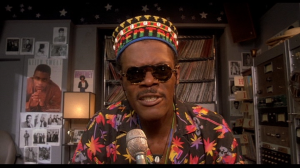
Attention, colleague. Perchance might I suggest that you are obligated to reduce the temperature.
I wasn’t going to write this piece. Indeed, I was hoping to finish a really nice piece about the impact of the Steven Salaita case on the norms of public behavior for academics in the age of instantaneous, mass publishing. But I woke up this morning to a ton of commentary, polls, snark, and accusations—all in the philosophical part of the interwebs.1 I actually am not inclined to link to any of it because (i) boy howdy does so much of it make academic philosophy look bad, (ii) much of the discussion takes place in walled gardens anyhow, and (iii) other people are better situated to address issues of responsibility and blame. Naturally I have views about many of these issues, but I am more strongly committed to the idea that much of those discussions haven’t been—and likely aren’t going to be—constructive; they don’t do much to fix the discipline. I mean, yeah, not everyone is equally to blame, but there is a lot of blame to go around.2
While the current unpleasantnesses online and in meatspace might just be growing pains of a field with a long history of problems with structural violence coming to grips with changes in demographics, methods, institutions, conceptions of professionalism, communication technologies, and the like, I worry that treating these unpleasantnesses as something that will just work itself out is a mistake.
The public faces of philosophy
Given the siloed and specialized nature of academic disciplines, few outside of philosophy read philosophy. As a result, they aren’t likely to have a rich understanding of what it is we do, the value of our labor, and our place in a university. Folks outside of philosophy periodically deride the importance of philosophy, and a standard—though inadequate or incomplete—response to such attacks is the suggestion that we are experts in argumentation. After all, we’re the ones who teach logic and critical thinking courses, and we frequently provide the critical analysis for other fields.
But when kerfuffles . . . erm, kerfuff, attention is drawn to our public face. Sure, there are folks who say all the right things about the dignified traditions that philosophers steward. Being what it is, hyperlinked media might lead folks who are noodling around on the internet in the aftermath of kerfuffles to places that suggest that maybe philosophers aren’t really that good with arguments, are subject to the same sorts of bad behavior in online fora that everyone else is, tend to overestimate their epistemic position, and the like. A perfectly natural response for an outsider to have to this sort of bad behavior is: “Well, if they don’t actually argue well, what the hell is it that they do? Is philosophy just an inferior kind of literary scholarship—like what we study in a literature class, but with strict rules about what counts as a good response to a text and a preference for stultifying or opaque prose? What good is that?”
Maybe philosophers, like Charles Barkley, aren’t role models. As I tell my students, I don’t even want to be me, so I am definitely not trying to make them into me. But we should also recognize the fact that what we do online does represent us in public. I’m not certain that I endorse this “marketing” consideration; after all, we’re all only human, and so we’re just as likely to say something inapt or risible as anyone else. Philosophers should be allowed to have bumper stickers on their cars that reduce a complicated debate to a clever slogan, drink too much and say silly things in public, cheer for the home team because they are the home team, send their lovers sappy poetry with dubious ontological commitments, have bad days when they’re grumpy as fuck, and the like. As someone who has been using the internet for more than twenty years, I’ve participated in my share of flame wars and I’ve crafted (perhaps more than) my share of hilarious and devastating takedowns. I’ve also argued that maybe there are people who don’t deserve a full measure of respect, and so showing them respect might be to give them more than one ought to.3 So, yeah, I get the impulse to throw down, and I don’t think that being “civil” is always a good thing.
On the other hand, ignoring the public image of philosophy that is created by online behavior is a bit like going outside or to class without taking a second to check the mirror. Sure, my students ought to be able to ignore my occasional booger, patch of unshaved hair on my head, or accidentally unzipped zipper and attend to the details of my amazing lecture on the myth of the Given. Nonetheless, it seems to me to be part of getting ready for class that I make sure that I’m not getting in my own way. And maybe people should understand that we are all of us fallible, see past our foibles, and charitably interpret our intemperate words as embodying an insight. But I don’t think we should behave as if these “oughts” predict what will happen.
Aaaaand? So what?
I don’t know that I have a bottom line here—beyond wondering how we let things get this way. I think it is a little bit embarrassing that we need a guide to respectful philosophical discussion, but I am glad that we are starting to pay attention to the humanity of our interlocutors. We don’t need a niceness police, and respecting the humanity of our interlocutors doesn’t mean that we must avoid raising pointed criticism. (Indeed, maybe respecting their humanity might require us to raise pointed criticisms on occasion.) Perhaps it is time, though, for us to wonder if what we put online is really a contribution to the discussion or merely venting spleen before we hit “publish” on sites affiliated with our profession.
I don’t think that this is some deep, transcendental obligation that arises from being a (capital p) Philosopher. Instead, I think that one ought to be aware of the consequences of one’s behavior, and in this case certain modes of online discourse are deleterious to the profession. If you care about the profession—and, heck, maybe you don’t—then I think it is time you think about how what you say online impacts that profession. Although I haven’t always behaved this way in the past, I commit to doing so going forward.
In addition, this injunction doesn’t apply to every conversation or even all online platforms—much like faculty might not dress to teach class the way they might dress to run to the market late at night. There are philosophy blogs where folks can go and write impossibly awful comments anonymously, and it is important for folks to be able to talk some shit around the water cooler that is facebook. But when you’re doing stuff related to the profession, I think it apropos to expect people to live up to the sometimes aspirational standards of the profession.

Pingback: Should the Philosophical Gourmet Report Continue? (Updated) | Daily Nous
Pingback: You can’t fight in here. This is the Seminar Room. | thoughtomatt